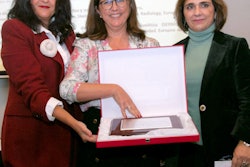
The Spanish Society of Medical Radiology (SERAM) has drawn attention to a new breast study by a research group at La Paz University Hospital in Madrid.
 Dr. María José Roca Navarro. Photo courtesy of SERAM.
Dr. María José Roca Navarro. Photo courtesy of SERAM.The study, called "Efficacy of cryoablation as a treatment for early-stage breast cancer," suggests that the percutaneous technique could replace surgical treatment of small, low-risk breast cancer, according to SERAM.
Cryoablation is based on the cytotoxic effects of cold, and it consists of 3 phases: freezing, passive thawing, and second freezing, which cause the instantaneous and delayed destruction of the cellular ultrastructure of tumors. Ultrasound guides the insertion of the needle through the tumor and is used for control throughout the procedure by visualizing the extension of the ice ball in real-time.
According to Dr. María José Roca Navarro, a lead author of the study, the approach carries the following advantages over surgery:
- It is a safe, simple, affordable, and painless technique.
- It is performed without sedation or general anesthesia.
- It is an outpatient procedure.
- The approach eliminates postsurgical complications, such as seromas, infections, hematomas, and chronic pain.
- It reduces psychological stress.
- It supposes a saving of material and personal resources.
- It provides positive immunological effects.
Cryoablation has already been included in clinical guidelines in the U.S. and is currently being investigated in Europe as a substitute technique for surgery in certain types of cancer through two ongoing trials, SERAM said.
The study was published in the society's journal, Radiologia. For more information, go to the SERAM website.



















